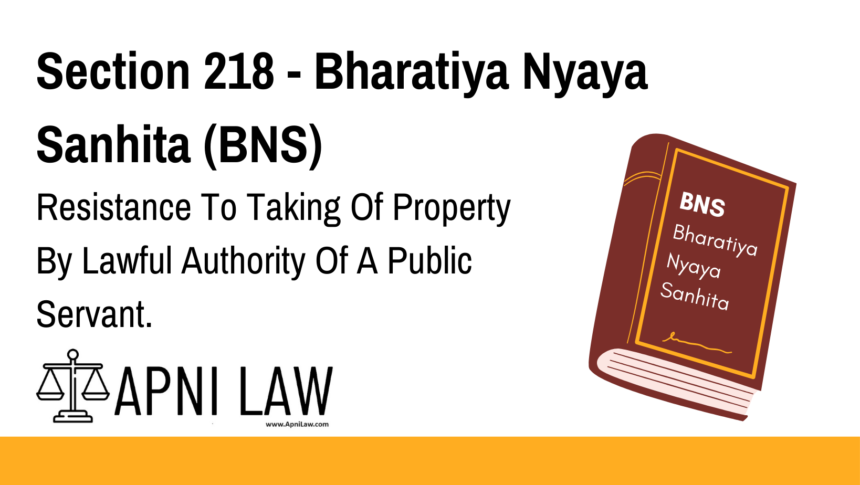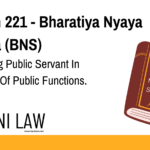Code: Section 218 BNS
Whoever offers any resistance to the taking of any property by the lawful
authority of any public servant, knowing or having reason to believe that he is such
public servant, shall be punished with imprisonment of either description for a term which
may extend to six months, or with fine which may extend to ten thousand rupees, or with
both.
Explanation of Section 218 BNS
What Does Section 218 BNS Cover?
This section penalizes individuals who intentionally resist or oppose the lawful taking of property by public servants.
Key Elements of the Offense:
- Resistance to Taking of Property
- The accused must have actively resisted a public servant seizing, confiscating, or repossessing property.
- Lawful Authority of a Public Servant
- The public servant must have been acting within their legal rights.
- Example: A tax officer seizing property for unpaid dues.
- Knowledge or Reasonable Belief
- The person resisting must know or have reason to believe that the individual is a public servant.
- Punishment
- Imprisonment: Up to 6 months.
- Fine: Up to ₹10,000.
- Both: In some cases, both penalties may apply.
Illustrations of Section 218 BNS
Example 1: Property Seizure by a Court Order
A person’s property is seized under a court order for non-payment of dues. If they physically resist the officers, they can be punished under Section 218 BNS.
Example 2: Eviction by Municipal Authorities
If a municipal officer lawfully evicts an illegal occupant from government land and the occupant physically blocks the process, this amounts to resistance under Section 218 BNS.
Example 3: Confiscation of Smuggled Goods
Customs officers seizing illegal goods at an airport face resistance from the owner. Such resistance is punishable under this section.
Common Questions and Answers on Section 218 BNS
1. Is Section 218 BNS a cognizable offense?
No, Section 218 BNS is a non-cognizable offense, meaning police need court approval before making an arrest.
2. Can a person be punished for verbally arguing with the public servant?
No. Mere verbal disagreement is not punishable. There must be physical resistance or obstruction to the lawful action.
3. What if the public servant acts unlawfully?
If the public servant exceeds their authority or acts illegally, the accused may not be guilty under this section.
4. What are the defenses against charges under Section 218 BNS?
A person may defend themselves by proving:
- The public servant had no legal authority to take the property.
- The resistance was accidental or misunderstood.
5. How is Section 218 BNS different from theft or criminal force?
- Theft (Section 303 BNS) involves dishonest taking of property.
- Criminal Force (Section 124 BNS) involves physical aggression.
- Section 218 BNS applies only when someone resists lawful property seizure.
Conclusion
Section 218 of the Bharatiya Nyaya Sanhita (BNS) ensures that public servants can lawfully perform their duties without unwarranted resistance. Any physical obstruction to a legal act can result in serious penalties.
For more legal updates, visit ApniLaw today! 🚀








